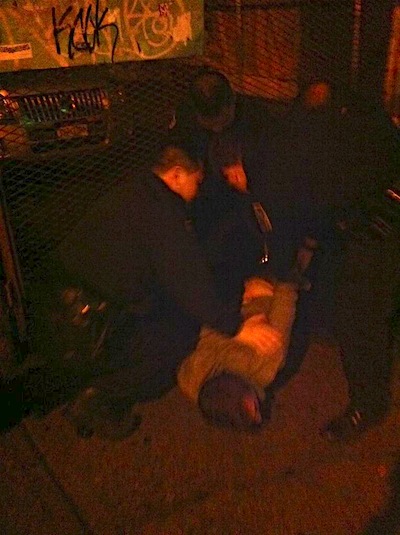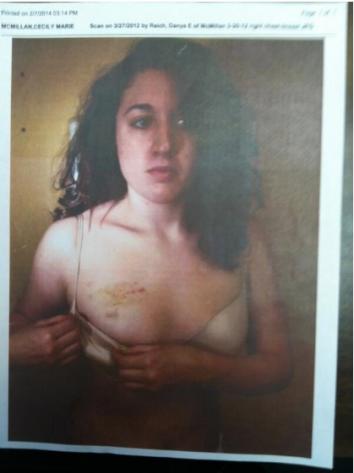On the heels of the NYPD’s disastrous social media campaign #myNYPD, which has provided an outlet for hundreds of New Yorkers tweet pictures of police beating them up, New York police continue to spread their bad rep beyond the outer boroughs. On Saturday night, police arrested 247365’s MacGregor Harp after he took photos of police brutality, which happened to be taking place outside of NADA’s afterparty at Tropical 128.
“I spent 20 hours trying to sleep on a piss-caked linoleum floor with cockroaches all over it,” he told us.
According to Harp, he stepped outside for air, only to witness police shoving an NYU student’s face into the ground, and getting pepper sprayed, across the street. (Harp and others aware of incident were careful to stress that the incident had nothing to do with NADA, but was simply happening on the street outside). He took dozens of photos of the incident, and at the moment he stepped off the sidewalk, police arrested him. A woman who goes by the name of Finch, and does contract work for NADA, was arrested when she tried to intervene.
“MacGregor stepped off the sidewalk, Finch got in the middle,” said NADA director Heather Hubbs. “They threw her down. Her knee was injured.” We’ve reached out to Finch for comment.
“It was a weird night,” said Hubbs. “It was actually a great party until that happened.”
Police charged Harp with an OGA [Obstructing Governmental Administration]. “When I got to the station, they realized the charge was absurd and now it’s “Disorderly Conduct”,” he said, noting it was a lower charge. “The courtesy, professionalism, and respect was switched on the moment I got into a room with the cameras on,” he said. “The sargent of the fifth precinct poked me in the chest, called me a ‘jerk off’, and said ‘This is no longer your liberal city.'” The NYPD’s public information department has yet to return our request for comment.
After spending twenty hours in prison (judges don’t work weekends), Harp’s lawyer advised him to plead guilty to the charge just so he could leave. He’s now on probation for the next year, and will file a complaint with the CCRB.
Though this kind of police behavior is reportedly common in the outer boroughs, it’s become more widely discussed across the city after Occupy.
“The main lesson that many of us learned after Occupy– which many people had learned already in different communities in New York, particularly communities of color, – is that the law is really up to the police to define at any given time,” artist and activist organizer Noah Fischer told us over the phone. “It may be legal to stand in the street, but depending on what situation they want to create, it can become instantly illegal, and they can arrest you and put you behind bars for it.”
“The police are constantly saying knock this chip off my shoulder,” he told us. “They’re continually creating a new rule, and the rules are actually provocations. Sometimes they’ll just randomly arrest you. That’s the case all over New York. Stop and frisk is even worse, it’s totally preemptive.”
In jail, Harp had also heard about “sweep up”, where police round up people off the streets in order to make their arrest quota. “If an officer hasn’t made enough arrests, you can get one just for watching someone dropping a bottle. They call it ‘getting their numbers up’. They have quotas. I learned this from people in the cell.”
“The question of documenting the police…obviously, that’s when it gets really troubling, because documenting is an important citizens right and responsibility, it’s a check on misuse of power,” Fischer told us. “And maybe it comes from the experience in Occupy, when police made so many bad moves on camera. A lot of these trials turned on documentation; a lot of people got acquitted from the presence of clear footage: pepper spray, or the police hitting without provocation. In Cecily [McMillan’s] trial, the key piece of documentation was edited by the judge, basically, just to see it from the police’s point of view; it started right at the moment when the camera turned on Cecily, the judge Zweibel did not allow further context.”
Fischer pointed out that in Cecily McMillan’s trial, the key piece of documentation was “basically edited” by Judge Zweibel, who only allowed footage to begin from the moment when the camera turned on Cecily– only after she’d been allegedly groped by the police.
It’s the kind of intimidation that scares the hell out of individuals like Harp. “Cecily has thousands of supporters. And look what happened to her.”
“After spending two days on a piss-soaked floor,” he said, “I do not want to go back there.”




{ 2 comments }
Too bad he pled guilty instead of fighting bogus charges and actually trying to do something to change the system he complains about.
there’s this… https://www.aclu.org/free-speech/you-have-every-right-photograph-cop
Comments on this entry are closed.